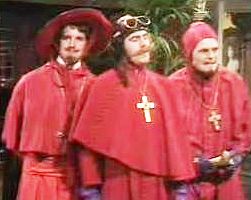 This is the fourth in a series of posts covering the hidden messages that sneak into American churches’ proclamation of the Gospel. For more background, please refer to this post.
This is the fourth in a series of posts covering the hidden messages that sneak into American churches’ proclamation of the Gospel. For more background, please refer to this post.
Ugh. Yeah, that title’s a woefully forced play on the old Disney flick about leprechauns. Hey, I can’t be a fount of creative wit every day, right?
Some “little people” who came out in droves when I asked for a suggestion of other hidden messages in American Christianity. Oddly enough, they were the least likely people to shout out a suggestion, but shout they did. In fact, I was afraid that if I did not post concerning their plight, I might be beaten to death by a shillelagh.
I’m not sure I can quote a Scriptural passage detailing the necessity of introverts for the Church, but neither can I make much case for all the raging extroverts who occupy just about every position of prominence in many churches.
There’s no doubt that I’m a raging extrovert. For most of my life I was deemed “intimidating”: 6’4″ 215 lbs, “Boeing 747 at takeoff” in vocal decibel strength (and nearly as constant as the traffic on Runway #2 at San Francisco International), and an “Oh yeah? Prove it!” kind of attitude. Got something to say that everyone wants said, but no one’s got the testosterone to say it? Ask Dan; he’ll say anything. In fact, we can’t shut the guy up. (Please, someone, anyone, find his off switch! We’re begging!) Now that I’ve crossed forty, I finally learned my lesson. Now I try to listen at least as well as I yammer. Nor does the limelight offer the same temptation it once did.
To the average introverted person, though, Dan circa 1985 was either the kiss of death or an object of awe—in the same way that the Space Shuttle Challenger explosion or an attack of flesh-eating bacteria inspires horrifying, sickening awe. “I…can’t…look…away! And the goggles, they do nothing!” What does this have to do with hidden messages in American Christianity? Well, here’s an exchange that actually occurred recently (in HEAVY paraphrase):
Dan: Some people are intimidated when they walk into a church. And even when they’ve grown accustomed to it, you still need to personally ask them to volunteer for things.
Extrovert #1: Preposterous! Why, no one has to ask me to do anything—I’m just there. And nine times out of ten, I’m leading the whole shebang! Why when I was in Desert Storm—
Extrovert #2 (loudly inserting a word edgewise): Well, in the thirty years I’ve been a member of this church—and that was before any of you were here, I might add—I’ve never heard such a thing!
Introvert #1 (taking his life in his hands): Uh, if I may interrupt, the reason you’ve never heard such a thing is that you’re always talking.
Introvert #2: {Silent nodding.}
Talk to any expert on this subject and they’ll tell you that America is the most extroverted country in the world and the complete converse of the rest of the world. We’re about 75% extroverts and 25% introverts. I think only the Australians approach that level of in-your-faceness.
There are plenty of sources out there that claim that the American church is increasingly becoming Hollywood-lite, a non-stop exercise in entertainment, but this is not the place for me to go down that path. All I can add is that as the need to make ourselves (supposedly) appealing to the world increases, our level of extroversion increases proportionately. A spectacle then, by definition, must be an expression of unrestrained extroversion. Is it any wonder then that today’s churches are noted for their stages rather than their altars?
When Pastor O’Gill stands up and tells the congregation to “Meet and greet your neighbor” or to “Pass the peace,” I’m certain a few hardcore introverts are wondering if they’re lucky enough to be in a church that has one of those “defibrillators for dummies” that are cropping up here and there. Worse yet, be the introverted visitors who are asked to stand up and introduce themselves to the gawk-eyed regulars! O’Gill then offers that church life revolves around small groups where real sharing (an introvert’s worst nightmare) occurs. And lastly, one of the worship committee gets up to say that there’s a lack of Scripture readers who can be called upon at a moment’s notice to read the weekly passages during the service. Oh, thank goodness. All the extroverts raised their hands—another bullet dodged.
(Megachurches are an odd thing for introverts, though. So big that the agoraphobia kicks in or so big that one can get lost in the crowd, get in and get out, with no one hurt? No way to tell. Maybe a little of both.)
Still, somewhere between the blare of a John Eldredge-inspired movie clip on the massive stage-flanking screens and the plethora of people clapping and raising their hands up for God (and everyone else) to see, introverts have got to be wondering if the message of the Church is “Next week, we’re gonna make you dance in the aisles, too.” And this is an Episcopal church!
Yeah, the tone of this post is a little lighter, but that’s only because I’m coming from that grossly overcompensated for extroverted side of the church. I can live in that world, though the spectacle of it sometimes makes even me a little queasy. Yet no matter how you look at it, nearly everything the Church does in 2005 is geared to people who talk first and ask questions later. Quiet is anathema in our sanctuaries on Sunday, as if reflection before the Lord is a diabolical plot hatched up by monks—Roman Catholic monks.
Not all people do relational well. While women outperform on the interpersonal side of things—the side that points to some level of extroversion—men don’t like all that hugging and chatting. When we see that churches today are about 62/38 female to male with that ratio growing more disproportionate, could it have something to do with the fact that extroversion and feelings are hailed by the American Church of 2005 while introversion and thinking are dwindling away in the message? In addition, the extroverted, anti-intellectual way we conduct many of our churches may be contributing to the dearth of Christian intellectuals today (who are typically men whether we like it or not.)
Let’s look at this another way. What’s the scariest possible Christian church denomination for an introvert? Pentecostals. Most comfortable is an old school Presbyterian or Episcopal church. To an introvert, there’s probably people ready to speak in tongues or hankering to jump a pew in that Pentecostal frenzy, whereas in the Episcopal church they may even let you sit in the narthex instead of the sanctuary if you ask meekly enough. Yet what is the trend in many of those old school churches? Well, no worse words could be heard than the pastor proclaiming from the pulpit, “Next week we begin our new contemporary praise and worship service. We permit you to raise your in hands worship, too.” Where can a true introvert go?
I hear the Orthodox Church is growing….
In all seriousness, while the message may be that we want all people to join in the community of saints, our delivery, and the message we’re proclaiming—even if we say it nicely—is that only extroverts need apply. We don’t know how to reach the introverts in our churches. We may have droned on so long that they may actually have had something to say that is vitally important to the health and welfare of the congregation, but we missed it amid the noise.
I’m not an introvert. I understand, however, that some of the pillars of our churches are those people who serve unseen. They’re not the glamour boys who hog the spiritual spotlight, but they’re the old men who have an intercessory prayer ministry only they know about, a ministry that has prayed over every person in the church at least once. They’re the folks who may be the only one sitting at the hospital bed, lending quiet comfort to the ill. No one notices them come in or leave, but they were there. Perhaps they, too, prayed powerful prayers that shook the gates of heaven.
We extroverts, the majority, are sending the wrong message in the church to people who are introverts. We need to step back and see if there are betters means for incorporating the types of spiritual exercises that appeal to introverts. We have to understand how the ways in which introverts can minister can benefit us all in the Church. We may have to stop assuming that because we gave a blanket greeting to a small collection of people on Sunday, we sufficiently greeted the introverts. We need to stop talking for a second and start listening. God sometimes speaks in whispers, so even He has an introverted side, too.
As much as this post has been a defense of introverts and the necessary ministry they bring, as an extrovert I must ask this of introverts: Meet us halfway. We’ll promise to tone down the frantic extroverted message we’re shilling if you’re willing to understand that community only works if you’re actively involved in the life of the church on all levels.
Deal?

 The very people of a God who is characterized by His Fatherly Love talk a good game about love, but the message we send out rarely starts with love. And when we end with it, that love's usually in the form of "Sorry about ripping your still-beating heart from your chest, but I did it in love."
The very people of a God who is characterized by His Fatherly Love talk a good game about love, but the message we send out rarely starts with love. And when we end with it, that love's usually in the form of "Sorry about ripping your still-beating heart from your chest, but I did it in love." This is the second in a series of posts covering the hidden messages that sneak into American churches’ proclamation of the Gospel. For more background, please refer to
This is the second in a series of posts covering the hidden messages that sneak into American churches’ proclamation of the Gospel. For more background, please refer to